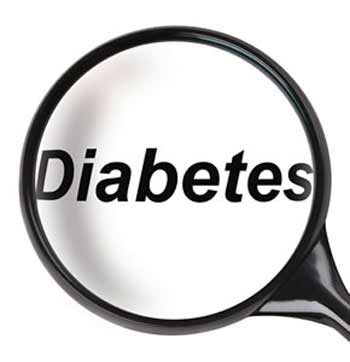Who gets Type 2 Diabetes?

Can you be born with Type 2 diabetes?
No. type 2 diabetes is a condition that develops over time. It is most common in people over the age of 40, but there are increasing numbers of children and teenagers who are developing Type 2 diabetes, especially those who are overweight and inactive.
What are my chances of getting Type 2 diabetes if one or both of my parents has it?
If one of your parents has Type 2 diabetes, you are at a slightly increased risk of developing it; if both of your parents have it, your risk is much greater. If you have a family history of diabetes, you can do a lot to reduce your risk by keeping your weight in the normal range and becoming more active if you need do.
My sister has been diagnosed with Type 2 diabetes. Should I be tested for it?
If you have a brother or sister with Type 2 diabetes you have an increased risk of developing the condition. If you have an identical twin sister or brother who has Type 2 diabetes, you have a very high chance of developing it. Having a blood test will reveal whether you have Type 2 diabetes. If you find you don’t have diabetes, you can take steps to reduce your risk of developing it in the future.
I am overweight. Does this mean I will get diabetes?
Not necessary, but being overweight can reduce your body’s ability to regulate glucose levels, which in turn can lead to Type 2 diabetes. You can dramatically decrease your risk of Type 2 diabetes by losing weight. How your weight is distributed is also important. Carrying extra fat around your waist rather than your hips is linked with Type 2 diabetes.
Is it true that ethnic background is a risk factor for Type 2 diabetes?
Yes, if you are of Mexican or Hispanic, African-American, or American Indian descent, you are two to three times more likely to develop Type 2 diabetes than if you are of Caucasian origin.
I gave birth to large babies but didn’t have gestational diabetes. Does this mean I won’t get Type 2 diabetes?
One reason that babies grow very large is because they have to make more insulin to deal with extra glucose coming through the placenta. Even though you weren’t diagnosed with gestational diabetes, finding out if any tests revealed an increased glucose level will help you and your health professional asses your level of risk of Type 2 diabetes in the future.
Risk Factors for Developing Type 2 diabetes
Your chances of developing Type 2 diabetes depend on a number of different factors, including your family background, your weight and body shape, and how much physical activity you get.
Lower risk
• Few or only one family member with diabetes
• Caucasian
• No previous gestational diabetes (diabetes that develops in pregnancy)
• Fairly active
• Normal weight for height
Higher risk
• Many family members with diabetes
• Mexican/Hispanic, African-American, or American Indian
• Gestational diabetes in the past
• Very little activity every day
• Overweight, especially around the waist

